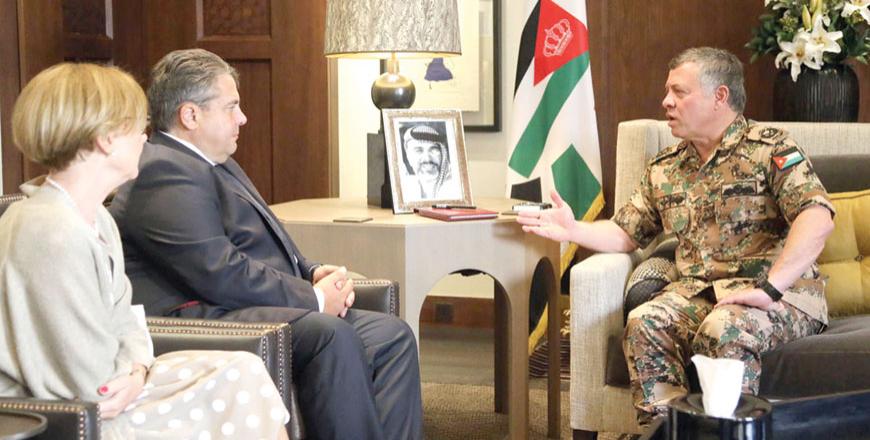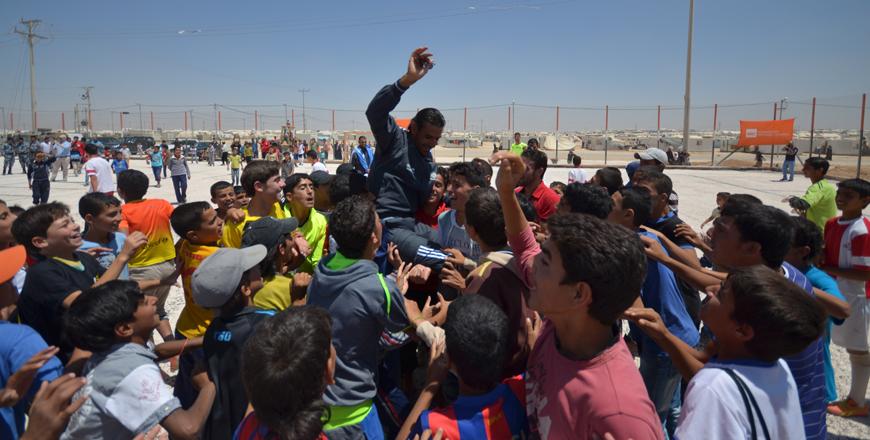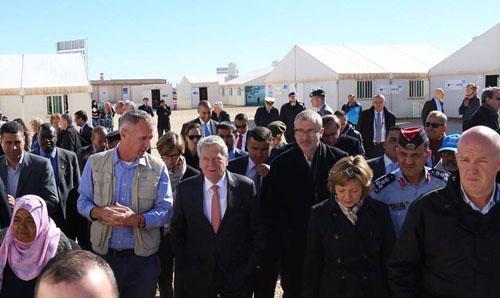You are here
King meets German official, discusses economic support
By Muath Freij - Sep 23,2015 - Last updated at Sep 23,2015

His Majesty King Abdullah meets with German Vice Chancellor and Federal Minister for Economic Affairs and Energy Sigmar Gabriel in Amman on Tuesday (Photo courtesy of Royal Court)
ZAATARI/AMMAN — His Majesty King Abdullah on Tuesday received a high-ranking German official to discuss economic support to Jordan in light of the challenges exacerbated by the presence of a large number of Syrian refugees in the Kingdom.
His Majesty stressed that donors and international organisations need to increase their support to help Jordan provide basic humanitarian needs to refugees, according to a Royal Court statement.
For his part, Vice Chancellor and Federal Minister for Economic Affairs and Energy Sigmar Gabriel praised the Kingdom's efforts in hosting over 625,000 Syrian refugees on its territory, stressing Germany's keenness to expand its cooperation and partnership with Jordan.
The meeting, which took place at Al Husseiniya Palace, also tackled the latest developments in the Middle East, the statement added.
Royal Court Chief Fayez Tarawneh, King’s Office Director Jafar Hassan, King’s Adviser and Rapporteur of the National Policies Council Abdullah Wreikat, German Ambassador to Jordan Birgitta Siefker-Eberle and Gabriel's accompanying delegation also attended the meeting.
Earlier in the day, Gabriel said he believes Germany, the US and Gulf countries need to step up their support to the Syrian crisis and UN agencies.
A report by the UN refugee agency said by June 2015 the number of people fleeing wars, conflict and persecution worldwide “has reached the highest level ever recorded”.
The German official listened to a briefing made by Jordanian security officials and UN agencies representatives on conditions of the Syrian refugees in Jordan and the difficulties the Kingdom is facing in this regard.
Jordan hosts around 1.6 million Syrians, of whom some 628,000 are registered refugees and 85 per cent live among host communities.
Gabriel met with a Syrian family at their caravan and talked to children at one of the camp’s schools. He also visited a medical centre and listened to a briefing by the centre’s workers.
Hovig Etyemezian, the UNHCR’s camp manager, said international delegation visits to the camp are “important”, urging the international community to increase their support to both the UN agencies and hosting countries like Jordan.
“We are optimistic, Germany has been one of the generous countries and it also opens doors for resettlement of refugees into Germany,” he told The Jordan Times.
He added that it is not Germany alone in this; “the international community needs to realise that they need to continue supporting Jordan as a country allow it to continue helping refugees. They need to invest in Jordan as Jordan’s economy needs more investments so that Jordan can cope with the increased number of populations in the country,” the UNHCR official added.
He noted that many refugees still want to go back to Syria, but the situation is not safe for them.
Etyemezian said the number of refugees now in Europe means “Europe is waking up now to the reality Jordan has been facing for more than three years,” as the refugees are exhausted and the war seems never-ending to them.
“Refugees know that if they go back home, there is a great risk of being injured or killed. They are going back home because we are not giving them a perspective of the future; refugees want to go to universities, they want to find a job but we also know that the Jordanian market cannot accommodate all refugees in the workforce.”
Etyemezian voiced concern over refugees going back to Syria to sell their lands, as “when you sell your land, you cut the tie between you and your homeland. We fear that more and more refugees risk not being able to save their lands if they cannot survive anymore.”
Related Articles
ZAATARI REFUGEE CAMP — When 15-year-old Mohammad Haj Ali arrived at the Zaatari camp two years ago, his main concern was to be able to play
AMMAN — German President Joachim Gauck and Germany's first lady, Daniela Schadt, on Tuesday visited the Azraq Refugee Camp, the Jordan News
AMMAN — With an additional 20.4 million euros to UNHCR, the UN Refugee Agency, made available through a special-purpose contribution, German



















